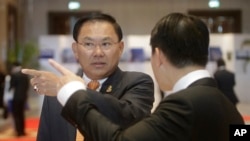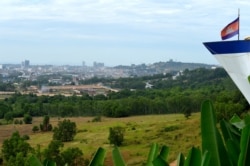The Cambodian government has granted a 600-hectare concession to the family of notorious tycoon Ly Yong Phat, whose sugarcane concessions have been at the center of human rights violations.
A government sub-decree, accessed by VOA Khmer this week, reclassified 600 hectares of state land in Preah Sihanouk’s Prey Nub district, which is close to the Sihanoukville airport and a short drive to the city center. The land was granted to tycoon Seng Nhak and Ly Arporn, who is Seng Nhak’s wife and the daughter of Cambodian People’s Party Senator Ly Yong Phat.
“Six hundred hectares of land in Ream and Bet Traing communes in Preah Sihanouk province’s Prey Nub district is carved out from the 2002 preservation area of flooded forests and is transferred from state public property to state private property,” reads June 9, 2020, sub-decree.
State land can be leased for private development only if it loses its stated public use, though no justification has been given for reclassifying the flooded forest land. The Ministry of Forestry oversees this land and carved out the land in a ministerial proposal.
Veng Sakhon, the Minister of Agriculture, Forestry and Fisheries, told VOA Khmer on Thursday that the land had lost its public use, and that the lessee would use it for tourism development.
“We want Preah Sihanouk province to attract more tourists and the land has no potential for [public] use anymore; it is not in the [public] interest to keep it,” he said.
With the recent increase in Chinese investment in Sihanoukville, several Cambodian tycoons have pivoted their focus to the port city and are developing large tourism and real estate development projects to take advantage of the rise in tourists from the mainland.
Minister Sakhon added that the company and authorities have ensured that there will be no land disputes on the land. He added that it was not “illegal” to give land to rich tycoons, such as Ly Yong Phat.
“It doesn’t mean that it is illegal when it is linked to the rich,” he said. “They do business legally. But [critics] always say high-ranking and rich people do work illegally.”
Seng Nhak is listed as a director at the controversial Kampong Speu Sugar, which is linked to his father-in-law, and was the target of the “Blood Sugar” campaign that highlighted forced evictions of villagers, with media reports pointing to alleged child labor as well.
These violations and others at sugar plantations across the country formed, in part, the basis for partial revocation of the European Union’s “Everything But Arms” trade preferences.
An assistant of Seng Nhak was informed of VOA Khmer’s queries but reporters were informed that Ly Yong Phat’s son-in-law was busy.
“His assistant said that he is very busy today and cannot give an interview,” said a receptionist at Premier Land Sihanoukville, a firm where Seng Nhak and Ly Arporn are directors.
Ly Yong Phat did not respond to queries sent to him on a messaging application.
Sreng Vanly, a provincial coordinator at rights group Licadho, said the two communes have seen a marked increase in Chinese investment, but that some villagers have yet to get land titles for their land.
“Several villagers are living there and they have not been given [land titles] as a solution for them,” he added.








